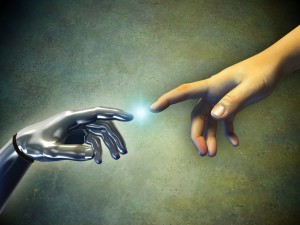 We would like to reassure you and say something like, don’t worry, humans are unique and cannot be replaced. But that’s not true. Kyle Gibson says that thanks to development of machine learning, robots can already solve problems that historically only humans could work out. Not just marketers should be concerned: by 2025 machines will overtake 30% of human jobs, including anesthesiologists, lawyers, analysts and surgeons.
We would like to reassure you and say something like, don’t worry, humans are unique and cannot be replaced. But that’s not true. Kyle Gibson says that thanks to development of machine learning, robots can already solve problems that historically only humans could work out. Not just marketers should be concerned: by 2025 machines will overtake 30% of human jobs, including anesthesiologists, lawyers, analysts and surgeons.
Even now robots are great at performing some of marketers’ tasks.
Segmentation
“Big Data-Driven Marketing: How machine learning outperforms marketers’ gut-feeling” article describes a fascinating experiment. Group of human marketers and an algorithm were to segment a base of contacts – task needed for telecom company, which wanted to issue campaign and pick perfect recipients.
Human marketers reached 0, 5 % conversion, while machines – 6, 42%. Competencies of humans proved useless, and empathy – unreliable.
Creativity
Machine won’t write a copy? Nonsense! In that area more and more new solutions combining Big Data and machine learning appear. And we’re not talking about mechanic texts, but about original content. MIT developed Deep Beat – an algorithm that generates poetry – actually it raps on demanded topic, with rhythm, rhymes and references to other pieces.
Here’s its work on the subject of love:
For a chance at romance I would love to enhance
But everything I love has turned to a tedious task
One day we gonna have to leave our love in the past
I love my fans but no one ever puts a grasp
I love you momma I love my momma – I love you momma
And I would love to have a thing like you on my team you take care
I love it when it’s sunny Sonny girl you could be my Cher
I’m in a love affair I can’t share it ain’t fair
Haha I’m just playin’ ladies you know I love you.
Impressive! But if you wouldn’t include that kind of artwork in your marketing, note that contrary to commonsensical belief robots, are really good at creating texts. That’s pretty ironical, David Raab says.
We can choose from advanced writing software which really makes writing much easier (as Automated Insights) and machines generating content for themselves. E.g. Persado collects data to increase persuasiveness of texts it creates. Economist and author Phil Parker admits that his books come out mostly thanks to dedicated software.
Actually creative jobs, which we used to perceive as irreplaceable, can be run by machines. Do we need writers and poets anymore?
Predicting – instead of machines
Good machine can replace that wayward character called customer, who fails to provide you precise answers in surveys. As “Improving Preference Prediction Accuracy With Feature Learning” indicates, if you want to learn about future needs of your customers, you shouldn’t ask them, but use a clever data solution. You can discover their preferences and future needs basing on their previous behavior – it’s faster and cheaper. You don’t have to acquire new data, but can utilize information you already have. Not to mention that results of machine predicting are far more accurate when compared to human efforts.
Personalization
Another paradox is personalization: to treat audience individually, we must resort to algorithms and Marketing Automation platform (even if you were sending emails to each recipient manually, you’d be less probable to meet his expectations than a software which can process a lot of data quickly). Machine enables us to communicate in a human way.
It will get cheaper
Machines are more efficient, faster and cheaper than people. E.g. Braxton KcKee observed that algorithm handles financial analytics much better than human. His tool, Ufora, helping investors decide, costs $10.
Financial analysts, along with marketers, are most endangered by technological revolution happening on our eyes. Our jobs change at tremendous speed.
Human needed to coordinate
Organizations applying such solutions and exploring Big Data are most successful, study shows. Is that a key? Raab claims that particular marketing tasks can be performed by robots, but they still need a human to orchestrate it. Is that the only unique human skill? Or maybe we will soon become redundant?
 Follow
Follow
















